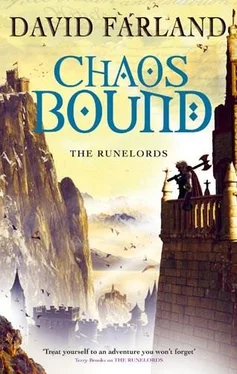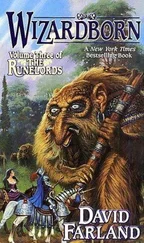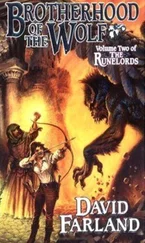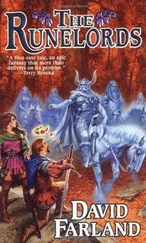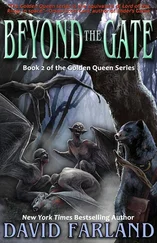Fallion had gone to heal the world; Myrrima felt almost certain that he had paid for his trouble with his life. No good deed ever goes unpunished.
Sage had listened to Myrrima’s words, to Rain’s warnings. Now she peered up at her mother with blue eyes blazing. She had deep red hair and a face full of freckles. “I want to go with you. There’s nothing holding me here. Everyone that I knew is gone. I want to find Talon and Fallion, make sure that they are all right. . . .”
Myrrima looked to Rain. “And you? Will you come with us?”
Rain hesitated. “I don’t think so. I don’t see why you have to go looking for trouble. If the wyrmlings come, we can fight them on our own ground.”
Myrrima knew that Rain would try to convince Draken to stay here with her. Myrrima didn’t know how to feel about that—whether to be angry or to hope that she succeeded.
So Myrrima hummed to herself until the shallow pool filled to a depth of a few inches. The Walkin children came by and all stood peering into the water eagerly, until Myrrima began to draw runes of healing and refreshment upon the water.
She bathed then, laving the clean water up over her own head, letting it wash over and through her. She peered up, and wished that she knew what the best course to follow might be. Dare she really take the children back to Mystarria, expose them to such dangers? Or could she possibly stay here? It would be easy to enchant some weapons, cast spells upon them that would vanquish unclean spirits. She could send them with Borenson.
When she finished her mind felt cleared of all doubt. She had to go with Borenson. She would need to enchant weapons not for one man, or even a hundred, but perhaps for thousands.
More importantly, she felt renewed, filled with energy. The bath seemed to wash away the curse that had sapped her strength.
So she bathed Sage now. As she laved the water over the girl, she asked her master for a small blessing upon Sage: “May the stream strengthen you. May the moisture renew you. May Water make you its own.”
As the last handful of water streamed down Sage’s face, she gasped as if in relief, and then broke into tears of gratitude for what her mother had done.
She reached up and began to wipe the tears away, but Myrrima pulled her hand back. “Such tears should be given back to the stream,” she said.
So Sage stood there in the stream, and let her tears fall into its still waters.
Afterward, Myrrima invited Rain into the pool, and offered to repeat the cleansing ceremony with each of the Walkin women and children.
For two long hours Myrrima stood in her blue traveling robes, her long dark hair dangling over one shoulder. Between each ceremony she would have to stoop and trace runes of cleansing and healing on the surface of the pool while water-skippers danced around her fingers.
One by one she washed everyone in the group.
Those children who had been cleansed instantly began darting around camp, their lethargy much diminished, while the womenfolk seemed at last to come alive.
Noon had just passed and Myrrima was thinking about lunch when a call went up from the Walkin children.
“There’s a ship! There’s a ship in the channel!”
The sighting aroused a bit of excitement, and the Walkin children raced to the lip of the cliff and peered down into the polluted water below.
Myrrima had been trying to keep the children away from the old river channel all day, afraid of what they might see floating past. But now the whole Walkin clan stood on the shore and waved.
“We’re rescued, Mother!” Sage was calling.
Myrrima walked to the bank and stood peering down.
It wasn’t one boat—it was nine, or one boat and eight rafts. They were paddling over the water, following the course seaward.
Three dozen men manned the vessels. “Halloo!” they called, waving bandanas and hats.
Myrrima drew closer, but one of the Walkin women strode forward and acted as voice.
“Need help?” one of the men called from a boat. “We’re from Fossil!” another shouted from a raft. “Is anyone injured?” a third cried.
The men paddled, doing their best to row the clumsy vessels in unison, and a fine tall man with a blunt face and long brown hair hanging free stood up in the boat.
“We’ve got a child dead,” the Walkin woman, Greta, shouted. “She’s beyond anyone’s help.”
“Do you need food or supplies?” the tall man asked.
“We got away with nothing more than what’s on our backs,” Greta said. “We had fish and crabs for dinner last night, but we daren’t eat it today.”
The boat floated near and finally bumped against the shore not far below them. “Where are your menfolk?” the leader called.
“They went west, searching for survivors,” Myrrima answered.
The leader gave them a suspicious look. Then he put on a pleasant face and called up, “I’m Mayor Threngell, from Fossil. We don’t have much in the way of supplies, but you’re welcome in our village. There’s food and shelter for any that need it.”
He searched the faces of the Walkins as if looking for someone familiar. “Are you locals?”
The Walkins hardly dared admit that they were squatters. “New to the area,” one of them answered. “We’re looking to homestead.”
Myrrima had met Mayor Threngell two years back at the autumn Harvest Festival; she recognized him now. “I’m local,” she said. “Borenson’s the name. Our farm was destroyed in the flood.”
The mayor grunted, gave her a cordial nod. “Go east, not twenty miles. It’s not an easy walk, but you should make it. You’ll find food and shelter there,” he affirmed. But the welcome in his voice had all gone cold, as if he wasn’t sure that he wanted to feed squatters. “Tell your men when they get back. Tell them that there is to be no looting of the dead, no salvage operations. This land is under martial law.”
Myrrima wondered at that. Law here in the wilderness was rather malleable. Vandervoot, the king, had lived on the coast. Most likely, Myrrima imagined that he was food for crabs about now. This mayor from a backwater town could hardly declare martial law.
More than that, she could see no justice in what Threngell proposed. Here he was: a man with land and horses, crops and fields, demanding that folks who had nothing take no salvage from the dead. But she knew that often lords would find reasons why they should grow a little fatter while the rest of the world grew a little leaner.
“Under whose authority was martial law declared?” Myrrima asked.
“My authority,” Mayor Threngell said, a warning in his voice.
Rage can give strength during battle; but he who surrenders to rage surrenders all reason.
—Sir Borenson
Sweating and grunting, Borenson used a log as a lever to pry the bow of the ship up so that it groaned and scraped.
For two long hours he’d been trying, with Draken, Baron Walkin, and the baron’s younger brother Bane to get the ship free. It was grueling labor—pulling wreckage from under the vessel, setting up logs to use as rollers under the ship, setting up other logs to use as pry bars, shoving and straining until Borenson felt that his heart would break.
Now, as the ship began to nudge, he realized that all of their labor might have been for nothing. The rising tide had lifted the back of the ship. Had the tides been extra high, he imagined that they just might have borne the ship out into open water. But the tide wouldn’t rise high enough today, so he shouted, “Heave! Heave!”
As one, all four men threw their weight into their pry bars, and the bow lifted into the air. Suddenly there was a groaning as the roller logs took the weight of the ship, and it began to slide backward into the ocean.
Читать дальше
